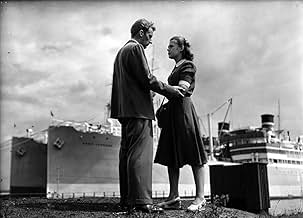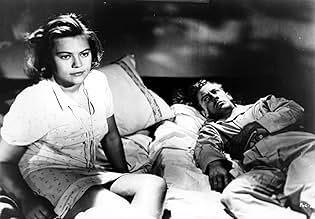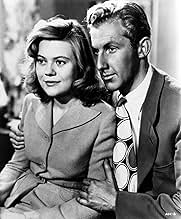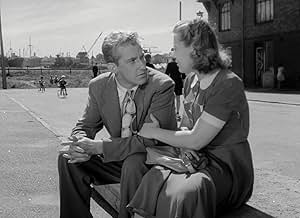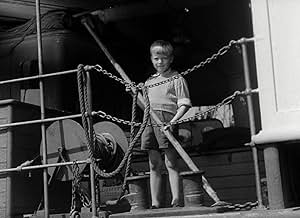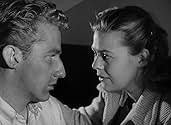VALUTAZIONE IMDb
6,6/10
2981
LA TUA VALUTAZIONE
Aggiungi una trama nella tua linguaA suicidal factory girl out of reformatory school, anxious to escape her overbearing mother, falls in love with a sailor who can't forgive her past.A suicidal factory girl out of reformatory school, anxious to escape her overbearing mother, falls in love with a sailor who can't forgive her past.A suicidal factory girl out of reformatory school, anxious to escape her overbearing mother, falls in love with a sailor who can't forgive her past.
- Regia
- Sceneggiatura
- Star
Edvard Danielsson
- Klockaren
- (scene tagliate)
Carl Deurell
- Prästen
- (scene tagliate)
Kolbjörn Knudsen
- En sjöman
- (scene tagliate)
Gunnar Nielsen
- En herre (1)
- (scene tagliate)
Recensioni in evidenza
6sol-
An early film from Ingmar Bergman, it is just as interesting on a visual scope as his films usually are, with the docklands filmed well and good use of panning and dolly work throughout. In terms of story and acting though, this is rather ordinary stuff, despite some interesting ideas and philosophies about freedom. It seems the easy way to out to just classify this film as interesting but not up to the standard that Bergman would later set, however I cannot think of much else to say here. It certainly is not as thought-provoking and intense as some of his later films, and for those not interested in Bergman or clever camera movement, I could easily imagine this piece coming across as boring.
One can see the beginnings of some pretty wonderful cinematography in this early work by Ingmar Bergman. It is a slice of life story about two down-and-outers who have been dealt a bad hand. The young woman has a sparkle, despite growing from an abusive family situation. She is dominated by her mother. She has spent time in a reformatory because her life is intolerable and she turns to a man who kindly takes her in. Because of her age, the mother can do what she wants. The sailor is a man who has just arrived at this port of call. His first act upon coming ashore is to rescue the young woman, who has decided top end it all by jumping in the harbor. Their paths cross again and it develops into a tenuous relationship. His first act is to get her into bed, but over time he realizes that she is all he has. Bergman does a nice job of making these people real. She has all kinds of demons and he has trouble accepting her morose being. She has a right to feel the way she does and he really is an unfeeling cad. If one is willing, he can see the framing of scenes, the positions of actors, and some pretty interesting symbols. It is a claustrophobic film. Outdoor scenes are scenes of freedom, even the suicide attempt; and indoor the forces of the outside close in. See this as a foundation piece.
After making it through many of the more well-known Ingmar Bergman films, I've turned my attention to early Bergman. This Ingmar Bergman retrospective has certainly been the one with the loosest viewing schedule, which isn't to the project's detriment. With a filmmaker like Ingmar Bergman, one with pronounced themes to his films, it is interesting to see how he carries out those themes in each period of his work. In his 1948 film, Port of Call, Bergman examined the intricacies of human existence through the eyes of a suicidal factory worker desperate to escape the weight of her overbearing mother. Starring Nine-Christine Jönsson and Bengt Eklund, Ingmar Bergman perfectly explores the struggle of living a life free of the strains of complicated human relationships and the prisons of our own minds that many are often unable to escape from.
Berit (Nine-Christine Jönsson) recently released from reformatory school following an attempted suicide, is back under the thumb of her manipulative and overbearing mother. She sees a way out when she meets Gösta, a man she is able to convince is the first one to experience her passions. Berit, unable to properly experience love, sees Gösta as, not only a way to break free from her mother's influence, but also to escape her laborious job at the factory. A marriage would also prove to Berit's social worker that Berit was establishing a stable foundation for herself and would be free from the threat of returning to the reformatory school. Her plans for freedom with Gösta are foiled, however, when he cannot forgive her past.
Family troubles, especially overbearing or neglectful parents are a constant theme in the films of Ingmar Bergman and apparently have been since his earliest features. The intricacies of familial disconnect are fascinating, and Bergman tunes into those intricacies in a way I have seldom seem from other filmmakers. One of my favorite aspects of Bergman films is how he illustrates the brokenness of people, and how that brokenness contributes to their inabilities to form successful relationships. I continue to be amazed how keenly Bergman tapped into the human spirit. Another mainstay in Bergman's filmography is how often he depicted people working jobs they don't like in order to maintain lives that were personally unfulfilling. Much like in Summer with Monika, our protagonists in Port of Call worked jobs that robbed them of their essential human fulfillment and left them in a constant state of emotional exhaustion. The only place to relieve the stresses of the world is in the cinema. The scene in which Berit has removed herself from every disappointment of existence when she is freely laughing in a crowded theatre was extraordinary. It reminded me of the scene in Louis Malle's Au revoir Les Enfants where the only place everyone was equal and could enjoy themselves was during a screening of Charlie Chaplin's The Immigrant. Cinema as an artistic medium has relieved the pressures of existence since its inception, and Ingmar Bergman films are no exception to this rule.
Berit (Nine-Christine Jönsson) recently released from reformatory school following an attempted suicide, is back under the thumb of her manipulative and overbearing mother. She sees a way out when she meets Gösta, a man she is able to convince is the first one to experience her passions. Berit, unable to properly experience love, sees Gösta as, not only a way to break free from her mother's influence, but also to escape her laborious job at the factory. A marriage would also prove to Berit's social worker that Berit was establishing a stable foundation for herself and would be free from the threat of returning to the reformatory school. Her plans for freedom with Gösta are foiled, however, when he cannot forgive her past.
Family troubles, especially overbearing or neglectful parents are a constant theme in the films of Ingmar Bergman and apparently have been since his earliest features. The intricacies of familial disconnect are fascinating, and Bergman tunes into those intricacies in a way I have seldom seem from other filmmakers. One of my favorite aspects of Bergman films is how he illustrates the brokenness of people, and how that brokenness contributes to their inabilities to form successful relationships. I continue to be amazed how keenly Bergman tapped into the human spirit. Another mainstay in Bergman's filmography is how often he depicted people working jobs they don't like in order to maintain lives that were personally unfulfilling. Much like in Summer with Monika, our protagonists in Port of Call worked jobs that robbed them of their essential human fulfillment and left them in a constant state of emotional exhaustion. The only place to relieve the stresses of the world is in the cinema. The scene in which Berit has removed herself from every disappointment of existence when she is freely laughing in a crowded theatre was extraordinary. It reminded me of the scene in Louis Malle's Au revoir Les Enfants where the only place everyone was equal and could enjoy themselves was during a screening of Charlie Chaplin's The Immigrant. Cinema as an artistic medium has relieved the pressures of existence since its inception, and Ingmar Bergman films are no exception to this rule.
A young man gets off a boat in a harbor. Moments later, he witnesses a young woman jump off the harbor into the water in obvious despair. They don't meet, but he just watches as someone closer jumps into the water and fishes her out, leaving the young woman crying on the pavement.
Thus starts Port of Call, a movie that touches on a few familiar themes that Bergman would visit in his later movies and, for a time, gets very closer to be a special gem in his early filmography. Missteps in the film's second half, though, hamper the film and keep it from being quite good.
The two young people meet at a night club some time later and immediately hit it off, but we can see that the woman, Berit, is beset by some emotional problems while the young man, Gosta, seems, perhaps, a little too aloof for something like a serious relationship. However, they enjoy each other's company, work through some early misunderstandings and a confrontation with a handsy foreman Berit works under that leaves Gosta bloody, and eventually decide to spend a weekend alone together. They are not married, so they pretend the relationship in order to get a room, but Berit is confronted by a figure from her past.
Berit lived in a very unhappy home growing up. Her parents hated each other, but they remained together (whenever her father wasn't at sea as a ship's first mate) in order to try and give Berit a stable home. That didn't really work and Berit ended up running away to live with a boy she hardly knew. Despite the match being remarkably happy, Berit was still underage, found, and sent to a reform house where she met Gertrude, a fellow delinquent. The two developed a common bond, if not a particular friendship, over their shared experience, and Gertrude's presence at the hotel where she works and the couple are staying, brings everything back. Berit decides to unload herself to Gosta whom she hopes will be understanding.
Gosta can't quite reconcile his feelings for Berit with her past, asking her how many men she had been with. Her looseness, of a certain variety, bothers him. The scene of the reveal is a bit awkward. On the one hand, there's a wonderful element of later Bergman as the camera focuses squarely on Berit with Gorsta in the background taking in the information. On the other hand, the film goes into a series of flashbacks that don't work that well, especially the last one that details the scene where Berit lived with another boy and his parents as the parents kicked her out. The reasons for the action we see are unclear, short, and involve three characters we've never seen before. The overall confessional would have been more effective with just Berit talking (a technique Bergman would later use much more frequently).
The scene that touches rather directly on later thematic chords from Bergman involves Gosta telling his female troubles to fellow dockworkers. One of them ends up telling him that no one else cares about the problems and only Gorsta and Birta do. This presages the silent God of Bergman's middle period, and the laser focus on relationships and those directly involved in his later period. However, the movie gets bogged down with competing ideas that get pushed on in front of another. It's not a complete failure, but it's enough of a distraction to take what had been a very promising film into something far more ordinary. Even Gertrude's death after a botched abortion feels a bit more like a distraction instead of something that feeds the central narrative.
Still, the movie shows Bergman's early promise. Performances are universally good, and the visual keys he would later use are strong as he alternates between real locations in Stockholm (similar to how he would use Faro later) to more stylized sets (evoking his later use of sets for certain films like All These Women). It's almost good, but not quite.
Thus starts Port of Call, a movie that touches on a few familiar themes that Bergman would visit in his later movies and, for a time, gets very closer to be a special gem in his early filmography. Missteps in the film's second half, though, hamper the film and keep it from being quite good.
The two young people meet at a night club some time later and immediately hit it off, but we can see that the woman, Berit, is beset by some emotional problems while the young man, Gosta, seems, perhaps, a little too aloof for something like a serious relationship. However, they enjoy each other's company, work through some early misunderstandings and a confrontation with a handsy foreman Berit works under that leaves Gosta bloody, and eventually decide to spend a weekend alone together. They are not married, so they pretend the relationship in order to get a room, but Berit is confronted by a figure from her past.
Berit lived in a very unhappy home growing up. Her parents hated each other, but they remained together (whenever her father wasn't at sea as a ship's first mate) in order to try and give Berit a stable home. That didn't really work and Berit ended up running away to live with a boy she hardly knew. Despite the match being remarkably happy, Berit was still underage, found, and sent to a reform house where she met Gertrude, a fellow delinquent. The two developed a common bond, if not a particular friendship, over their shared experience, and Gertrude's presence at the hotel where she works and the couple are staying, brings everything back. Berit decides to unload herself to Gosta whom she hopes will be understanding.
Gosta can't quite reconcile his feelings for Berit with her past, asking her how many men she had been with. Her looseness, of a certain variety, bothers him. The scene of the reveal is a bit awkward. On the one hand, there's a wonderful element of later Bergman as the camera focuses squarely on Berit with Gorsta in the background taking in the information. On the other hand, the film goes into a series of flashbacks that don't work that well, especially the last one that details the scene where Berit lived with another boy and his parents as the parents kicked her out. The reasons for the action we see are unclear, short, and involve three characters we've never seen before. The overall confessional would have been more effective with just Berit talking (a technique Bergman would later use much more frequently).
The scene that touches rather directly on later thematic chords from Bergman involves Gosta telling his female troubles to fellow dockworkers. One of them ends up telling him that no one else cares about the problems and only Gorsta and Birta do. This presages the silent God of Bergman's middle period, and the laser focus on relationships and those directly involved in his later period. However, the movie gets bogged down with competing ideas that get pushed on in front of another. It's not a complete failure, but it's enough of a distraction to take what had been a very promising film into something far more ordinary. Even Gertrude's death after a botched abortion feels a bit more like a distraction instead of something that feeds the central narrative.
Still, the movie shows Bergman's early promise. Performances are universally good, and the visual keys he would later use are strong as he alternates between real locations in Stockholm (similar to how he would use Faro later) to more stylized sets (evoking his later use of sets for certain films like All These Women). It's almost good, but not quite.
Berit's been punished and reformed, by those so much better and informed, now she's open eyed, attempts suicide, just can't fit the ideal they want formed (girls just want to have fun).
Gosta won't go sailing anymore, seeks the sanctuary of being on the shore, he's met a nice lady, who's past's a bit shady, unsure if that's where he wants to moor (the lost soul who doesn't know what he wants).
You're not like us, so we're going to make you like us. The oppressive approaches to managing adolescents who don't subscribe to the images society demands and expects, magnificently performed and presented - makes you so happy you're alive today and not then.
Gosta won't go sailing anymore, seeks the sanctuary of being on the shore, he's met a nice lady, who's past's a bit shady, unsure if that's where he wants to moor (the lost soul who doesn't know what he wants).
You're not like us, so we're going to make you like us. The oppressive approaches to managing adolescents who don't subscribe to the images society demands and expects, magnificently performed and presented - makes you so happy you're alive today and not then.
Lo sapevi?
- QuizThe book which Gösta reads on his bed is 'Resor utan mål' ('Journeys Without Destination') by Swedish author and future Nobel laureate in Literature (1974) Harry Martinson. Martinson was, indeed, a sailor before becoming an author, and the book, published in 1932 as Martinson's first prose volume (his greatest fame would come for his poetry), was a document of his own experiences as one, written at twenty-eight after he had given up the sea due to a combination of lack of employment and a bout of tuberculosis. A sailor like Gösta would indeed have found much interest in the book, as it dealt realistically with the life of a sailor from his country living a life very similar to his own. The book itself has sadly never been published in English, but Martinson's second novel, 'Kap Farväl!', somewhat similar to 'Resor utan mål', was translated as 'Cape Farewell'. Director Ingmar Bergman was indeed an admirer of his countryman Martinson and, in 1964, he staged the premiere of Martinson's play 'Tre knivar från Wei' ('Three Knives From Wei'), although, unfortunately, he considered the production an unmitigated disaster.
- BlooperWhen the camera pans from Gösta to Skåningen in the whistling scene, an object which is probably a microphone can be seen briefly in the upper right frame.
- Citazioni
Gertrud's Father: She never gave me any joy. Perhaps it's turned out for the best.
- ConnessioniFeatures Stackars lilla Sven (1947)
- Colonne sonoreLa paloma
("A Dove")
Composed by Sebastian Iradier (1859)
Swedish text by Ernst Wallmark
Performed by Bengt Eklund
I più visti
Accedi per valutare e creare un elenco di titoli salvati per ottenere consigli personalizzati
- How long is Port of Call?Powered by Alexa
Dettagli
- Tempo di esecuzione1 ora 40 minuti
- Colore
- Mix di suoni
- Proporzioni
- 1.37 : 1
Contribuisci a questa pagina
Suggerisci una modifica o aggiungi i contenuti mancanti

